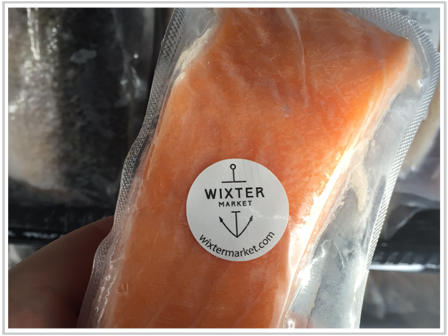 Thanks to the miracle of modern refrigeration, people need not despair if they live more than a few miles from the ocean—they can still get all the seafood their hearts desire. But to know what they’re getting, they need something more: good sea food labels. This sub-specialization of freezer labels provides not just identification information, but also health warnings for some kinds of seafood (like oysters, mussels, and others that can provide allergic reactions). This is a federal requirement: if you package seafood of any kind, you may need to include this information on your custom printed seafood labels, or as separate health warning seafood labels.
Thanks to the miracle of modern refrigeration, people need not despair if they live more than a few miles from the ocean—they can still get all the seafood their hearts desire. But to know what they’re getting, they need something more: good sea food labels. This sub-specialization of freezer labels provides not just identification information, but also health warnings for some kinds of seafood (like oysters, mussels, and others that can provide allergic reactions). This is a federal requirement: if you package seafood of any kind, you may need to include this information on your custom printed seafood labels, or as separate health warning seafood labels.
Nowadays, consumers are also very curious about sourcing and sustainability information, to the point where they may not buy if the custom seafood labels on your products don’t say exactly where the seafood comes from, and if there’s any worry that the fishery is in danger of collapse. Even better, many people will pay more for products with this information on the seafood labels.They have become worried about sustainability as harvests continue to decrease, while others want to know not just country a certain type of fish comes from, but whether it was caught in the wild or not.
For example, swordfish that the seafood label shows were caught in Canada may not be as popular to Americans, if only because the Canada fishery hasn’t been labeled sustainable (and because they tend to arrest American boat crews that end up in Canadian waters, accidentally or not). Of course, products made from deep-water ocean fish (most ocean fish, actually) bear custom printed wild-caught seafood labels, since no one is farming them yet. Salmon often have wild-caught seafood labels, too, though there are some that bear custom printed farmed seafood labels, Salmon connoisseurs prefer wild-caught salmon and will pay extra for it, but many of us can’t tell the difference
Those in the know prefer freshwater species like tilapia and catfish to bear farmed seafood labels, because of the natural diet of those species, and the fact that they can concentrate pollutants in their flesh. Custom farmed seafood labels let them know they’re getting quality, clean seafood.
Then there are the sustainable seafood labels, which are very important to those of us with conservationist concerns. A custom sustainable seafood label on the package that will command higher prices, especially if it’s a Marine Stewardship Council label. The MSC is the organization that declares a particular fishery sustainable. MSC labels are increasingly common in all supermarkets, from the higher-end chains right down to Walmart.
Even simple fish labels are very important, since people go for kinds of fish they like best. Fish type isn’t as obvious as whole fish when it comes to fillets, steaks, and chunks. Folks want to know if they’re getting cusk, swai, tilapia, pollock, shark, monkfish, or mud puppy. Make sure your custom printed fish labels are bold, so you can hook your customers with ease!
Whatever you need in the way of seafood labels, Etiquette Systems is here for you. We’re freezer label experts, NOT resellers. We print freezer labelsin-house, on our own press. We know what kinds of stocks, inks, and adhesives go together to produce the best freezer labels for your needs, no matter what—including custom seafood labels. So cast us a quote, and we’ll strike quickly to provide you with the best possible price on top-quality custom printed seafood labels. Whether you’reselling crab, lobster, squid, shrimp, fish or even jellyfish labels, our custom seafood labels are the best bait for your customers.
